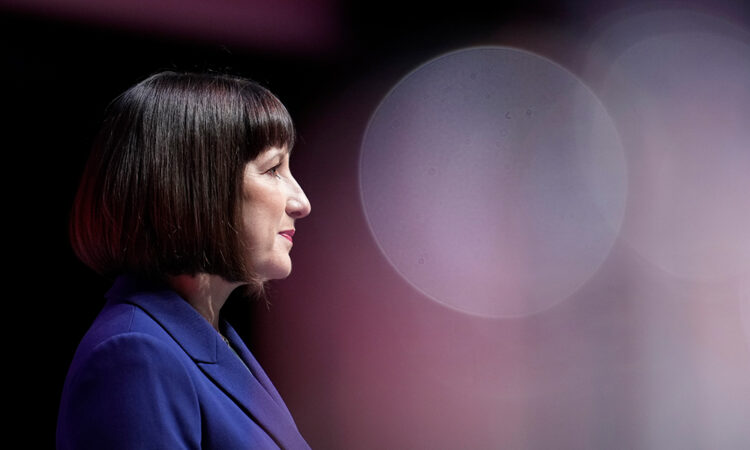
Outside a café on the outskirts of Reading, Rachel Reeves is listening to the concerns of small-business owners. ‘Something that has affected us over the past couple of years is our relationship with Europe,’ says an attendee to nods from the others. ‘We end up not trading because it’s not worth it.’
Reeves sticks to the script that there will be no rejoining the EU (‘We’re not going to go back in, that ship has sailed’) but says that relations can be improved. The shadow chancellor is here to support the Labour candidate Yuan Yang, a former FT journalist. It’s one of the final stops on her campaign tour of the UK, which has ranged from Doncaster and Morecambe to Reading and Chipping Norton.
Reeves promises to behave, but Labour has been accused of a conspiracy of silence on spending decisions
Reeves has spent much of her time meeting as many business leaders as possible and reassuring them that Labour can be trusted on spending. Her team have been trying to eke out something resembling a healthy diet on the road. ‘There was one day when we didn’t have any of our five a day before 4 p.m. and that was a bad day,’ she says, smiling. She watched one of the election debates from the gym on the treadmill.
She’ll need all the energy she can get. Reeves has been billed as the UK’s first female chancellor – though she is keen not to take anything for granted. Even now, when we speak, she never lets ‘if we win’ become ‘when we win’. But others are already making preparations: civil servants have discussed whether the urinal in the chancellor’s private Edwardian bathroom should be removed in anticipation of her arrival. Is Reeves fine with a urinal? ‘Not really,’ she laughs. She says her approach is about ‘smashing glass ceilings and urinals’. In other words: get the builders in. Time for a bidet.
‘Our first step on the economy is bringing stability back,’ she says. ‘That is what I am determined to do, that is not going to change the day after the election if we are successful. What the financial markets and investors have had to go through these past few years – instability, unfunded commitments – it’s just not going to be what you get with me. I’ll make sure that the sums always add up, bring that stability back so that businesses can plan with confidence for the future. I think the investors like what they hear from me.’
There will be no emergency budget. She wants all her plans to be assessed and scored by the Office for Budget Responsibility, so her first Budget will not be until autumn at the earliest. By then, France may well have a new government too, under the 28-year-old president of the National Rally, Jordan Bardella – a prospect that is making the French markets squirm. A Trump victory in the United States also looks probable.
‘We might be in a position where for the first time in a long period of time it is actually Britain that looks like the safe harbour for investors in an increasingly volatile world,’ says Reeves. ‘If other countries want to turn to more populist answers… But in the UK we hope, and we’ll see what happens, people are turning to a party that is putting stability front and centre. We’re being honest that the inheritance is tough and we are not going to be able to do everything we want straight away.’ Reeves plans to hold a global investor summit in the first 100 days of a Labour government to underline her credentials.
A lot is riding on the summit’s success. Labour has plans for supply-side reform through a shake-up of planning rules, but Reeves plans no serious tax cuts to boost the economy. Instead, her strategy is to inspire confidence and persuade business to invest. Rishi Sunak tried to achieve something similar after Liz Truss: he hoped that by coming across as the more credible figure, markets would lower interest rates. He was disappointed, and mortgage rates have slowly been on the rise for months, even if markets expect that the Bank of England base rate is now on a downward trajectory.
Market nerves are not really about which party is in government, but the extent to which the UK economy is vulnerable to debt and how much could go wrong if politicians panic. Reeves has promised to behave, but even the Institute for Fiscal Studies has accused Labour (along with the Tories) of a conspiracy of silence on the difficult spending decisions that will greet a new government.
Around the shadow cabinet table, Reeves already has a reputation for saying no. Her Labour critics view her as the straitjacket on a more radical agenda. Spending requests are likely only to go up once the party is in government, but she is determined to hold the line she has in opposition. Her favourite parts of Labour’s manifesto are the grey pages at the back which say where the money is coming from.

Being chancellor can be a lonely job. Has she been taking much advice from those who previously held the post? ‘I always am happy to receive advice,’ she says. She confirms that George Osborne has offered his. ‘Alistair Darling was a good friend and mentor of mine. He passed away last year, but I sought advice from him as well. In the end, the challenges that I’d face if I become chancellor are different from those that George Osborne faced 14 years ago and different from what Gordon faced 27 years ago. I have to forge my own path.’
She is keen to build links with Janet Yellen, who would be her US counterpart. When Joe Biden appointed Yellen four years ago, much was made about her being the first woman to head the US Treasury. The mood changed when inflation spiked. Under much criticism, Yellen has admitted that she was wrong about the path the economy would take. If Reeves is in No. 11 this time next week, she can expect the same level of scrutiny in due course.






